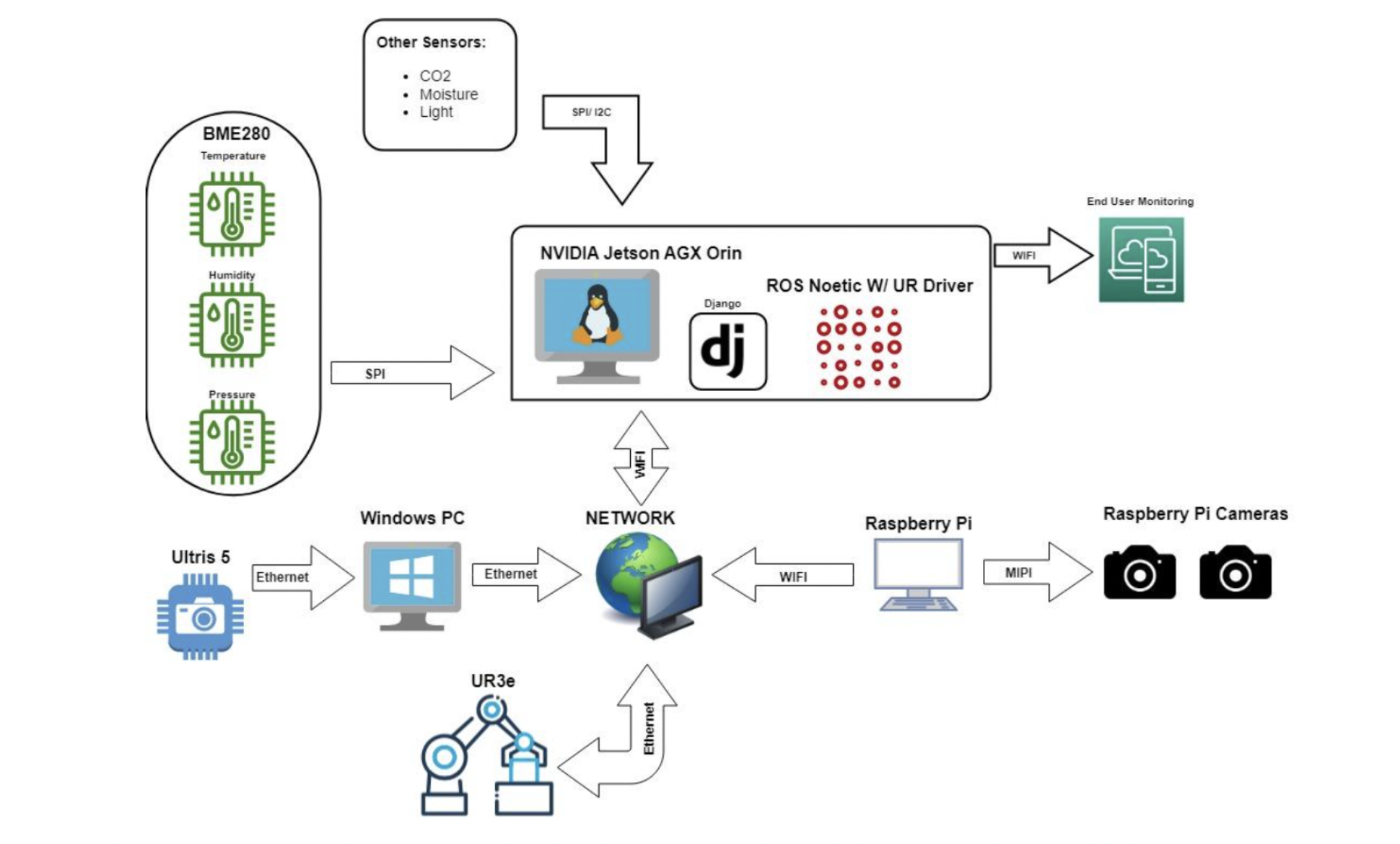Research Project
Astro Cultivators: Autonomous Growth System for Space Farming
Research Team
Lead Researchers:
- Bingbing Li, Manufacturing Systems Engineering
- Xunfei Jiang, Computer Science
Collaborators:
- Annette Besnilian, April Diederich, Andreas George, Julie Miller, Marilyn Magaram
Center for Food Science, Nutrition, and Dietetics
Student Team:
- Anthony Morales-Badajoz, graduate student in Computer Engineering.
- Neville Elieh, undergraduate student in Computer Science.
- Elliot Sadler, graduate student in Manufacturing Systems Engineering.
- Jasmine Glover, undergraduate student in Mechanical Engineering.
- Manoj Nizampatnam, graduate student in Computer Science
- Troy Israel, undergraduate student in Computer Engineering.
- Andrew Wang, student at Portola High School.
- Larry Zhang, student at Agoura High School.
Funding
- Funding Organization: Donation from CSUN Alumni Mrs. Susan Ettinger
- Funding Program: NASA Deep Space Food Challenge Phase 1 and Phase 2
Abstract
The autonomous space farming system could be used to grow self-pollinating crops in space exploration missions that require no human intervention. Our goal is to utilize hyperspectral imaging and traditional imaging to allow for machine learning models to be used and retrained for not only our crops, but others as well. Temperature, humidity, and pressure sensors coupled with a robotic arm will care for and tend to the crops at every stage of development. This system can decrease crew members’ input needed to operate the plant growth systems in deep space by providing autonomous monitoring, real-time data reporting, ambient environment management, automatic harvesting, and cleaning. Crops with high nutrient content, high acceptability ratings, dwarf growth habits, and short harvest cycles (Sugar Ann Snap Peas and Red Robin Tomato) will initially be grown in this modular system, which has the potential to be scaled up or down depending on the mission. A variety of “pick and eat” crops can be grown to provide palatable, safe, nutritious foods that are familiar foods for crews to consume. To reduce resupply from Earth, the seeds from these crops have the potential to be saved and used to grow continuous generations of crops.
Motivation/Research Problem
The major mission of space food development is to provide a safe, nutritious, and acceptable food system that can function for a long-duration spaceflight, such as a human Mars mission in the 2030s. Researchers have gained large progress on plant growth in space stations in the past 40 years; however, NASA’s Advanced Food Technology Project (AFTP) ISS food system is inadequate for 5-year missions beyond Low Earth Orbit (LEO) (i.e. storage). The two main causes of long-term storage (i.e. longer than 3 years) were nutritional content of the food and inadequate food acceptability, which led to insufficient intake by the crew. Missions to Mars will rely on packaged foods from Earth, which will meet the macronutrient needs of astronauts but are subject to degradation of vitamin C, vitamin B1 and are deficient in vitamin K. Providing familiar foods from Earth and growing fresh produce to supplement nutrient deficiencies will be vital for the health of the crew. Space food planting is still mainly managed by the crew, which has brought up challenges for crew who are not scientists in agriculture. There is an urgent need for an autonomous system to manage the growth of plants from seed to seed.

Research Questions and Research Objectives
In this project, we aim to build an autonomous space farming system that could be utilized in space exploration missions without human intervention. The system will provide autonomous monitoring, real-time data reporting, ambient environment management, and automatic harvesting and cleaning. It will be developed to meet these favorable qualities through Artificial Intelligence (AI) and Controlled Environment Agriculture (CEA).
Research Methods
The food technology is to be housed by an enclosure containing an adept automated plant health monitoring system equipped with imaging sensors and passive sensors, all of which be used in conducting non-destructive analysis. This system will be used to produce crops, such as tomatoes, using NASA plant bags that are filled with a medium consistent with Martian soil. A variety of “pick and eat” crops will be grown to provide palatable, safe, nutritious foods that are familiar foods for crews to consume. To reduce resupply from Earth, the seeds from these crops should have the potential to be saved and used to grow continuous generations of crops. The space farming system could manage the environmental elements and support operations for data transmission from input devices using a main control module, and provide real-time assessment of the environment and plant health conditions. This includes assessments of roots, stems, and leaves. The automatic computing and analysis results in an adaptive system that reduces human intervention while promoting plant growth and health, as well as real-time visualization.
Research Deliverables and Products
- One ACM conference paper accepted for publication: Anthony Morales-Badajoz, Neville Elieh, April Diederich, Elliot Sadler, Jasmine Glover, Manoj Nizampatnam, Troy Israel, Andrew Wang, Larry Zhang, Annette Besnilian, Andreas George, Julie Miller, Xunfei Jiang, Bingbing Li*, “Astro Cultivators: Autonomous Growth System for Space Farming based on Machine Vision and Multi-Sensor Fusion”, Proceedings of Cyber-Physical Systems and Internet of Things Week 2023 (CPS-IoT Week Workshops ’23), San Antonio, Texas USA, May 9-12, 2023.
- An autonomous farming system that monitors the growth of plants, controls a robot arm to perform cleaning and harvesting.
- Intelligent algorithms to detect the stems, leaves and fruits, and classify the growth and health condition of the plants.
- Conference and Journal papers in the areas of smart agriculture, cyber-physical system (CPS), and Internet of things (IoT).
Research Timeline
Start Date: 02/01/2021
End Date: TBD
Lead Researchers:
- Bingbing Li, Manufacturing Systems Engineering
- Xunfei Jiang, Computer Science
Collaborators:
- Annette Besnilian, April Diederich, Andreas George, Julie Miller, Marilyn Magaram
Center for Food Science, Nutrition, and Dietetics
Student Team:
- Anthony Morales-Badajoz, graduate student in Computer Engineering.
- Neville Elieh, undergraduate student in Computer Science.
- Elliot Sadler, graduate student in Manufacturing Systems Engineering.
- Jasmine Glover, undergraduate student in Mechanical Engineering.
- Manoj Nizampatnam, graduate student in Computer Science
- Troy Israel, undergraduate student in Computer Engineering.
- Andrew Wang, student at Portola High School.
- Larry Zhang, student at Agoura High School.
Funding
- Funding Organization: Donation from CSUN Alumni Mrs. Susan Ettinger
- Funding Program: NASA Deep Space Food Challenge Phase 1 and Phase 2
